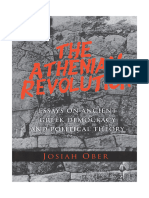Greek Political Thought - Syllabus - SPR
Greek Political Thought - Syllabus - SPR
Uploaded by
PaoRobledoCopyright:
Available Formats
Greek Political Thought - Syllabus - SPR
Greek Political Thought - Syllabus - SPR
Uploaded by
PaoRobledoOriginal Description:
Original Title
Copyright
Available Formats
Share this document
Did you find this document useful?
Is this content inappropriate?
Copyright:
Available Formats
Greek Political Thought - Syllabus - SPR
Greek Political Thought - Syllabus - SPR
Uploaded by
PaoRobledoCopyright:
Available Formats
Tufts University - Spring Courses 2013
CLS 0084: Greek Political Thought
CLASSICS 0084: GREEK POLITICAL THOUGHT
Syllabus
Class Meetings - ANDN 309
Tuesday 10:30-11:45 am
Thursday: 10:30-11:45 am
Course Instructor
Monica Berti
Department of Classics - 326 Eaton Hall
monica.berti@tufts.edu
Office Hours
Tuesday 12:00-3:00 pm; or by appointment
Eaton 326
Textbook
RYAN K. BALOT, Greek Political Thought, Blackwell Publishing (Malden, MA 2006) ISBN 1-4051-0030-3
(paperback)
Other Readings and Texts
Other readings and texts listed in the syllabus will be given to the students during classes and posted on the
course Trunk site (https://trunk.tufts.edu).
Course Description
The modern term politics comes from the Greek politikos (of, or pertaining to, citizens and the city) and the
reflection about political life and constitutional forms is one of the most important contributions of ancient
Greece. The aim of this course is to explore origin and development of Greek political thought because it is
essential for our understanding of contemporary world, especially when we discuss themes such as
democracy, equality, justice, and the confrontation between East and West. The course will be a survey of
Greek thought in English translation from Archaic times to the Hellenistic age. Students will also have the
opportunity to learn Greek words of the political language by searching new digital tools available through the
Perseus Digital Library (http://www.perseus.tufts.edu/hopper/), in order to understand the etymology of much of
our political terminology. Homeric epics, Hesiod, and the lyric poets reveal the first political reflection that
testifies the change from the world of the kings to the new role of the aristocracy and the emerging needs of
oppressed people. The search for justice and new solutions to civic coexistence permeate the poetry of Solon
and the action of archaic lawgivers. In the Fifth and Fourth century we have the great explosion of the
democratic political thinking and the debate about Athenian imperialism, which are expressed by many
different media, as the Greek drama, the works of the great historians Herodotus, Thucydides, and
Xenophon, orators speeches, and Sophists arguing about ethics, politics, and the relationship between law
and nature. The discussion about the meaning of law, the relationship between the citizen and the city, and
the teaching of virtue strongly emerge in the trial of Socrates and in the reconstruction of his personality by
Plato, who speculates on philosopher rulers, justice, the good city, and practical politics in the Republic and the
Laws. Aristotle is the first political scientist and his natural philosophy greatly influences his ideas about
household, slavery, justice, and the distribution of power in the city, together with his classification of
constitutions and theories about their evolution and change. With Alexander the Great and the end of Greek
cities freedom we enter a new age where individual needs and a different way of conceiving politics are
expressed by Cynics, Stoics, and the Epicureans, while Hellenistic theories concerning kingship develop a new
conception of rulership before Greece is conquered by Rome.
Tufts University - Spring Courses 2013
CLS 0084: Greek Political Thought
Course Requirements and Expectations
Preparation for attendance and participation in seminar discussions.
Assigned Readings: to be read before class.
Assigned Texts: to be read and discussed in class with the instructor.
Written assignments: weekly journaling exercises of roughly two pages double-spaced that engage critically
with the Texts read and discussed in class during the week. A printed copy of the journal is due on
Tuesday before class.
Research Project abstract of 1-2 pages double-spaced with preliminary bibliography (March 7) that results
in a Paper of 8-10 pages (April 18). The aim of the Research Paper is to analyze topics treated in class
focusing on the terminology of Greek political thought. Students are expected to use search tools available
through the Perseus Digital Library to find words of the political language in Classical sources.
N.B. Written assignments that are submitted late will be penalized one-half letter grade per day late.
Examinations
Midterm Examination (Tuesday, March 12).
Final Examination (Thursday, April 25).
Topics and Reading Assignments
WEEK ONE
1. Introduction to the Course
THURSDAY, JANUARY 17
Reading: R.K. BALOT, Greek Political Thought, Blackwell Publishing (Malden, MA 2006), pp. 1-15 (Chapter 1.
Introduction: How to Do Greek Political Thought)
Text: Aristotle, Politics 1.1252a.24-1253a.29
WEEK TWO
2. Justice in Homer and Hesiod
TUESDAY, JANUARY 22
Reading: R.K. BALOT, Greek Political Thought, Blackwell Publishing (Malden, MA 2006), pp. 16-37 (Chapter 2.
Archaic Greece and the Centrality of Justice. Achilles, Agamemnon, and Fair Distribution. Justice as
Distinctively Human. Institutions and Values of the Early Polis. What is Justice? The Voice of the
Oppressed and the Origins of Political Thought. The Egalitarian Response. The Elitist Response)
Text: Homer, Iliad 18.478-607; Homer, Iliad 2.207-282; Hesiod, Works and Days 11-46, 213-285
3. Archaic Lawgivers and Archaic Sparta
THURSDAY, JANUARY 24
Readings: K.A. RAAFLAUB, Poets, Lawgivers, and the Beginning of Political Reflection in Archaic Greece, in
C. ROWE & M. SCHOFIELD (eds.), The Cambridge History of Greek and Roman Political Thought, Cambridge
University Press (Cambridge 2008), pp. 42-48 (7. Archaic lawgivers); R.K. BALOT, Greek Political Thought,
Blackwell Publishing (Malden, MA 2006), pp. 37-41 (Case Study: Sparta and the Politics of Courage)
Texts: Plutarch, The Life of Lycurgus 1, 4-6; Xenophon, The Spartan Constitution 2-4
WEEK THREE
4. Democracy at Athens
TUESDAY, JANURAY 29
Reading: R.K. BALOT, Greek Political Thought, Blackwell Publishing (Malden, MA 2006), pp. 41-57 (A Second
Case Study: Archaic Athens and the Search for Justice. Chapter 3. Democratic Political Thinking a Athens.
Evidence and Sources. Democracy Ancient and Modern)
Texts: Plutarch, The Life of Solon 13-16; Herodotus 3.80-82
Tufts University - Spring Courses 2013
CLS 0084: Greek Political Thought
5. Democracy and Freedom
THURSDAY, JANUARY 31
Reading: R.K. BALOT, Greek Political Thought, Blackwell Publishing (Malden, MA 2006), pp. 57-63 (Democratic
Conceptions of Freedom)
Text: Thucydides 2.35-46
WEEK FOUR
6. Democracy and Deliberation
TUESDAY, FEBRUARY 5
Reading: R.K. BALOT, Greek Political Thought, Blackwell Publishing (Malden, MA 2006), pp. 63-68 (Democratic
Deliberation)
Texts: Plutarch, The Life of Aristides 7; Pseudo-Andocides, Against Alcibiades 2-6
7. Democracy and Leadership
THURSDAY, FEBRUARY 7
Reading: R.K. BALOT, Greek Political Thought, Blackwell Publishing (Malden, MA 2006), pp. 68-73 (Courage,
Trust, and Leadership)
Texts: Aristophanes, Knights 40-68, 125-144, 179-193, 211-219, 225-229, 667-682, 1110-1150
WEEK FIVE
8. Democratic Political Thought
TUESDAY, FEBRUARY 12
Reading: R.K. BALOT, Greek Political Thought, Blackwell Publishing (Malden, MA 2006), pp. 73-85 (Democratic
Political Thought outside Athens? Protagorean Arguments for Democracy. Democratic Conceptions of
Equality. Justice and the Demos)
Texts: Diodorus of Sicily 11.86.4-87.6; Plato, Protagoras 320d-328d
9. Democracy and Tragedy
THURSDAY, FEBRUARY 14
Reading: S. GOLDHILL, Greek Drama and Political Theory, in C. ROWE & M. SCHOFIELD (eds.), The
Cambridge History of Greek and Roman Political Thought, Cambridge University Press (Cambridge 2008), pp. 60-81
(1. The Institution of the Theatre. 2. 2. Political Themes of Tragic Writing. 3. The Oresteia)
Text: Aeschylus, Eumenides 443-753
WEEK SIX
10. Criticizing Athenian Democracy
TUESDAY, FEBRUARY 19
Reading: R.K. BALOT, Greek Political Thought, Blackwell Publishing (Malden, MA 2006), pp. 86-97 (Chapter 4.
Criticizing Democracy in Late Fifth-Century Athens. Mapping out the Problem: The Old Oligarch); P.
CARTLEDGE, Ancient Greek Political Thought in Practice, Cambridge University Press (Cambridge 2009), pp. 140142 (Appendix II: The Old Oligarch: a close reading)
Texts: Thucydides 1.23, 3.82-84; The Old Oligarch (Constitution of the Athenians) 1
11. Law, Nature, and Athenian Imperialism
THURSDAY, FEBRUARY 21
Reading: R.K. BALOT, Greek Political Thought, Blackwell Publishing (Malden, MA 2006), pp. 97-113 (Modern
and Ancient Quandaries. Nomos and Phusis. The Challenge of Trasymachus and Callicles. Thucydidean
Imperialists Revisit Nomos and Phusis)
Text: Thucydides 5.84-116
Tufts University - Spring Courses 2013
CLS 0084: Greek Political Thought
WEEK SEVEN
12. Socrates and Athens
TUESDAY, FEBRUARY 26
Reading: R.K. BALOT, Greek Political Thought, Blackwell Publishing (Malden, MA 2006), pp. 113-137 (Socrates
and Nomos. Logos and Ergon. Democratic Epistemology and Relativism. Democratic Epistemology and
Untrustworthy Rhetoric or, Where Does the Truth Lie? Socrates and Athens)
Texts: Plato, Crito 49e-54d; Plato, Apology 28a-34b
13. Imperialism in Fifth-Century Greece
THURSDAY, FEBRUARY 28
Reading: R.K. BALOT, Greek Political Thought, Blackwell Publishing (Malden, MA 2006), pp. 138-176 (Chapter
5. Imperialism. Aristotle Analyzes Imperialism. Definitions and History. Monarchic Imperialism. Natural
Superiority? Debating Athenian Imperialism. Final Thoughts)
Texts: Thucydides 1.68-88; Xenophon, Cyropaedia 1.1.1-5, 8.8
WEEK EIGHT
14. The Debate on Athenian Imperialism and the Democracy of the Fathers
TUESDAY, MARCH 5
Reading: R.K. BALOT, Greek Political Thought, Blackwell Publishing (Malden, MA 2006), pp. 177-187 (Chapter
6. Fourth-Century Revisions. The Ancestral Republican Solutions. The Monarchic Solution)
Texts: Lysias, Funeral Oration 17-57; Isocrates, On the Peace 95-135; Isocrates, Areopagiticus 20-55; Xenophon,
Agesilaos 5-8
15. Plato and the Superiority of Philosophy to Politics
THURSDAY, MARCH 7
Reading: R.K. BALOT, Greek Political Thought, Blackwell Publishing (Malden, MA 2006), pp. 187-197 (Platos
Solutions. Criticizing Contemporary Politics. Plato on Rhetoric and Order in the Gorgias)
Texts: Plato, Republic 7.514a-520a; Plato, Gorgias 506c-523a
WEEK NINE
16. MIDTERM EXAMINATION - TUESDAY, MARCH 12
17. The Ideal City of Plato
THURSDAY, MARCH 14
Reading: R.K. BALOT, Greek Political Thought, Blackwell Publishing (Malden, MA 2006), pp. 197-209 (The
Priority of Reason in City and Soul: Platos Republic. Educating Citizens in the Classical Context. Politics and
Ethics. Philosophical Rulers)
Texts: Plato, Republic 4.434d-445e; 5.449a-464b; 6.484a-502b
WEEK TEN
18. Platos Political Philosophy in the Statesman and the Laws
TUESDAY, MARCH 26
Reading: R.K. BALOT, Greek Political Thought, Blackwell Publishing (Malden, MA 2006), pp. 210-226 (Platonic
Political Philosophy after the Republic)
Texts: Plato, Statesman 287b-305e; Laws 12.960b-969d
19. Aristotle and the Analysis of Constitutions
THURSDAY, MARCH 28
Reading: R.K. BALOT, Greek Political Thought, Blackwell Publishing (Malden, MA 2006), pp. 227-234 (Chapter
7. Aristotles Political Thought. Civic Cinflict, Emotion, and Injustice: Observing the Polis as It Is)
Texts: Aristotle, Politics 4.1288b.9-1290a.29, 5.1301a.19-1304b-19; Constitution of the Athenians 41
Tufts University - Spring Courses 2013
CLS 0084: Greek Political Thought
WEEK ELEVEN
20. Naturalism and Slavery in Aristotle
TUESDAY, APRIL 2
Reading: R.K. BALOT, Greek Political Thought, Blackwell Publishing (Malden, MA 2006), pp. 234-245
(Exploring What Ought To Be: Aristotles Naturalism. Aristotle on the Good Life. Nature in the Politics.
Aristotle on Slavery)
Text: Aristotle, Nicomeachean Ethics 1.1094a.1-1094b.11; Politics 1.1252a.1-1255b.40
21. Citizens and Citizenship in Aristotle
THURSDAY, APRIL 4
Reading: R.K. BALOT, Greek Political Thought, Blackwell Publishing (Malden, MA 2006), pp. 245-257 (Polis and
Citizenship in General. Aristotles Best Polis. Political Possibilities in Existing Cities)
Texts: Aristotle, Politics 3.1274b.33-1275b.23, 3.1284a.1-1284b.34, 4.1293b.22-1294b.43, 4.1295a.25-1296b.13,
7.1328a.23-1329a.39
WEEK TWELVE
22. Aristotle and the Classification of Constitutions
TUESDAY, APRIL 9
Reading: R.K. BALOT, Greek Political Thought, Blackwell Publishing (Malden, MA 2006), pp. 257-261 (The Best
Constitution in Relation to Existing Conditions. Classification of Constitutions)
Text: Aristotle, Politics 3.1278b.6-1281a.11
23. Aristotle and the Masses
THURSDAY, APRIL 11
Reading: R.K. BALOT, Greek Political Thought, Blackwell Publishing (Malden, MA 2006), pp. 261-265 (The
Power of the Masses. Conclusion)
Text: Aristotle, Politics 3.1281a.12-1283a.22
WEEK THIRTEEN
24. Political Thought in the Hellenistic Age
TUESDAY, APRIL 16
Reading: R.K. BALOT, Greek Political Thought, Blackwell Publishing (Malden, MA 2006), pp. 266-280 (Chapter
8. Hellenistic Political Thought. Theory of Kingship. The Traditional Schools)
Texts: Diodorus of Sicily 17.117; Pseudo-Aristotle, Rhetoric to Alexander 1420a.6-1421b.7; Letter of Aristeas to
Philocrates 9-11, 184-202
25. Cynicism, Stoics, and Epicureans
THURSDAY, APRIL 18
Reading: R.K. BALOT, Greek Political Thought, Blackwell Publishing (Malden, MA 2006), pp. 280-297 (New
Directions: Cynics, Stoics, and Epicureans. The Politics of Cynicism? Stoicism and Epicureanism)
Texts: Diogenes Laertius, Lives and Opinions of Eminent Philosophers 6.21-38, 7.110-126, 10.117-121a, 10.139-154
WEEK FOURTEEN
26. Graecia capta: Greek Thought and Roman Conquests
TUESDAY, APRIL 23
Reading: R.K. BALOT, Greek Political Thought, Blackwell Publishing (Malden, MA 2006), pp. 298-302 (Chapter
9. Epilogue: The Question of Politics); P. CARTLEDGE, Ancient Greek Political Thought in Practice, Cambridge
University Press (Cambridge 2009), pp. 131-137 (The Greek Legacy and Democracy Today)
Texts: Polybius, Histories 6.3-4, 6.11-14
27. FINAL EXAMINATION - THURSDAY, APRIL 25
You might also like
- Democracy Ancient and ModernDocument30 pagesDemocracy Ancient and ModernP DasNo ratings yet
- YashodharMehta sResearchinAstrologyBWDocument22 pagesYashodharMehta sResearchinAstrologyBWprasannanda100% (2)
- Poster Genealogie FemininDocument1 pagePoster Genealogie FemininRenata SousaNo ratings yet
- Greek Philosophy and City States ProjectDocument19 pagesGreek Philosophy and City States Projectvgaming99r75% (4)
- The Athenian Revolution - Essays On Ancient Greek Democracy and Political Theory-Princeton University Press (2020)Document225 pagesThe Athenian Revolution - Essays On Ancient Greek Democracy and Political Theory-Princeton University Press (2020)Jean FariasNo ratings yet
- Lewis, Politeiai and NomoiDocument19 pagesLewis, Politeiai and NomoiScott KennedyNo ratings yet
- Graduate Generals Theory Reading List As Revised For Circulation October 2010Document10 pagesGraduate Generals Theory Reading List As Revised For Circulation October 2010Fran_JrNo ratings yet
- Political Theory Past Exam Questions 2008 To January 2017Document30 pagesPolitical Theory Past Exam Questions 2008 To January 2017Alan SaralNo ratings yet
- Ancient Political PhilosophyDocument12 pagesAncient Political PhilosophyAlyosha AlyoshaNo ratings yet
- Isonomia and the Public Sphere in Democratic AthensDocument29 pagesIsonomia and the Public Sphere in Democratic Athensericfokou0410No ratings yet
- History of Western Political Thought - Political Theory I SyllabusDocument6 pagesHistory of Western Political Thought - Political Theory I SyllabusaltamashasifghoriNo ratings yet
- Written Assigment Week 2Document6 pagesWritten Assigment Week 2Moses HarryNo ratings yet
- Isonomia and The Public Sphere In: Democratic AthensDocument28 pagesIsonomia and The Public Sphere In: Democratic AthensCraig MawsonNo ratings yet
- three concepts of tyranny in western medieval political thhoughtDocument23 pagesthree concepts of tyranny in western medieval political thhoughtAriadna SousaNo ratings yet
- Tentative Syllabus 26:510:537 Problems in Ancient History: Athenian Democracy (Spring 2016)Document4 pagesTentative Syllabus 26:510:537 Problems in Ancient History: Athenian Democracy (Spring 2016)govandlaw4671No ratings yet
- The Political Philosophy of Plato and Ar PDFDocument4 pagesThe Political Philosophy of Plato and Ar PDFshrishti srivastavaNo ratings yet
- CLAS 470 SyllabusDocument11 pagesCLAS 470 SyllabususchumanitiesNo ratings yet
- Athens and The Spectrum of LibertyDocument45 pagesAthens and The Spectrum of LibertyMaria Sozopoulou100% (1)
- Syllabus RequirementsDocument3 pagesSyllabus RequirementsLoredanaUrsuNo ratings yet
- SS 01 CC 1 Module 1 Topic 1Document4 pagesSS 01 CC 1 Module 1 Topic 1Anshrah Tehreem RanaNo ratings yet
- Written Assignment Unit 1Document6 pagesWritten Assignment Unit 1Mariane BarrosNo ratings yet
- POL 303 SyllabusDocument5 pagesPOL 303 SyllabusAnNo ratings yet
- Helping The Dead Speak - Leo Strauss, Quentin Skinner and The Arts of Interpretation in Political ThoughtDocument22 pagesHelping The Dead Speak - Leo Strauss, Quentin Skinner and The Arts of Interpretation in Political ThoughtBruno GarciaNo ratings yet
- (Philosophia Antiqua 143) Anders Dahl Sørensen-Plato On Democracy and Political Technē-Brill Academic Publishers (2016)Document207 pages(Philosophia Antiqua 143) Anders Dahl Sørensen-Plato On Democracy and Political Technē-Brill Academic Publishers (2016)César S. Díaz MedinaNo ratings yet
- Aristotle_on_Extreme_Tyranny_and_ExtremeDocument29 pagesAristotle_on_Extreme_Tyranny_and_ExtremeTroiloNo ratings yet
- Historical Memory and Democratic CitizenshipDocument22 pagesHistorical Memory and Democratic Citizenshipion irauliNo ratings yet
- The Birth of DemocracyDocument18 pagesThe Birth of DemocracyshazkamNo ratings yet
- PSC 5323 Political Inquiry Scope and Methods: David - D - Corey@baylor - EduDocument4 pagesPSC 5323 Political Inquiry Scope and Methods: David - D - Corey@baylor - EduJenny NguyenNo ratings yet
- International Relations Theory On Realism PRESENTATIONDocument20 pagesInternational Relations Theory On Realism PRESENTATIONGRANT NWAOBURUNo ratings yet
- LAW AND LITERATURE January April 2016 NADocument6 pagesLAW AND LITERATURE January April 2016 NArishikNo ratings yet
- The Athens Democracy and Its CriticsDocument27 pagesThe Athens Democracy and Its CriticsSarah TaliNo ratings yet
- Political ScienceDocument22 pagesPolitical Sciencemihaela buzatu100% (1)
- Baps 11 Block 01Document60 pagesBaps 11 Block 01nagendra.anumulaNo ratings yet
- Culture Matters Essays in Honor of Aaron WildavskyDocument244 pagesCulture Matters Essays in Honor of Aaron WildavskyLeonardo FiscanteNo ratings yet
- Courses For Programme B.A. (Hons) Political ScienceDocument3 pagesCourses For Programme B.A. (Hons) Political ScienceKrishangi KathotiaNo ratings yet
- Politcal ScienceDocument17 pagesPolitcal ScienceRommel F. delos SantosNo ratings yet
- Citizens to Lords: A Social History of Western Political Thought from Antiquity to the Late Middle AgesFrom EverandCitizens to Lords: A Social History of Western Political Thought from Antiquity to the Late Middle AgesRating: 5 out of 5 stars5/5 (1)
- Mass and Elite in Democratic Athens: Rhetoric, Ideology, and the Power of the PeopleFrom EverandMass and Elite in Democratic Athens: Rhetoric, Ideology, and the Power of the PeopleRating: 4.5 out of 5 stars4.5/5 (7)
- CPS 3201 Political Theory Course Outline, Sept 2024Document6 pagesCPS 3201 Political Theory Course Outline, Sept 2024omondifrank377No ratings yet
- Klosko HistoryofpoliticaltheoryDocument2 pagesKlosko HistoryofpoliticaltheoryThum BertosNo ratings yet
- Ancient Greece 10 Grade World History Katie LindenbergDocument21 pagesAncient Greece 10 Grade World History Katie Lindenbergapi-251245517No ratings yet
- CPP Syllabus - 2023Document4 pagesCPP Syllabus - 2023jatinmahlawat5No ratings yet
- Aristotle PDFDocument47 pagesAristotle PDFshubhamsouravNo ratings yet
- MARTIN Medieval Commentaries Aristotle Politics (1951)Document17 pagesMARTIN Medieval Commentaries Aristotle Politics (1951)renanteleslimitedNo ratings yet
- Political ScienceDocument22 pagesPolitical Sciencemihaela buzatuNo ratings yet
- Aristotle - Politics - Internet Encyclopedia of PhilosophyDocument50 pagesAristotle - Politics - Internet Encyclopedia of PhilosophyHemang LathNo ratings yet
- CHOICE November 2003 Vol. 41 No. 03Document34 pagesCHOICE November 2003 Vol. 41 No. 03Lee CheekNo ratings yet
- Editorial Statement: ArticlesDocument3 pagesEditorial Statement: Articles123nadamasNo ratings yet
- Michael Oakeshott, the Ancient Greeks, and the Philosophical Study of PoliticsFrom EverandMichael Oakeshott, the Ancient Greeks, and the Philosophical Study of PoliticsNo ratings yet
- Aristotle MylegalnotebookDocument17 pagesAristotle MylegalnotebookRaamit aroraNo ratings yet
- 国际哲学前沿问题(二) 589618 240724Document5 pages国际哲学前沿问题(二) 589618 240724amadeus021021No ratings yet
- Pol 101Document22 pagesPol 101freepsplustrial4No ratings yet
- Political Science - Its RootsDocument3 pagesPolitical Science - Its RootsrubidrooNo ratings yet
- Political Science: Arranged By: Arya DestianDocument6 pagesPolitical Science: Arranged By: Arya Destianarya destianNo ratings yet
- Sem115 Week 7 - 9Document20 pagesSem115 Week 7 - 9Dua LipaNo ratings yet
- Response Paper 2 / C / Kelompok 4 / Adinda P. C. (I91219065), M. ARIF ADHIMUDDIN (I91219090), M. FAUZI HADI P. (I91219094)Document2 pagesResponse Paper 2 / C / Kelompok 4 / Adinda P. C. (I91219065), M. ARIF ADHIMUDDIN (I91219090), M. FAUZI HADI P. (I91219094)DandyBagusIndrawanNo ratings yet
- Political Philosophy Is The Study of Questions About The: AntiquityDocument8 pagesPolitical Philosophy Is The Study of Questions About The: Antiquityanon-906532No ratings yet
- 1 ImagineDocument2 pages1 ImaginePaoRobledoNo ratings yet
- Staat Und Raum.: The AAG Review of BooksDocument5 pagesStaat Und Raum.: The AAG Review of BooksPaoRobledoNo ratings yet
- Generation and Corruption. Aristotle There Raises Two Puzzles ThatDocument16 pagesGeneration and Corruption. Aristotle There Raises Two Puzzles ThatPaoRobledoNo ratings yet
- Lambert Van Velthuysen, 1622-1685 (Author) - Reseña LeviathanDocument313 pagesLambert Van Velthuysen, 1622-1685 (Author) - Reseña LeviathanPaoRobledoNo ratings yet
- Aristotles Rational EmpiricismDocument259 pagesAristotles Rational EmpiricismPaoRobledoNo ratings yet
- Running Head: Purpose As A Moral VirtueDocument32 pagesRunning Head: Purpose As A Moral VirtuePaoRobledoNo ratings yet
- RASASHALA Price ListDocument16 pagesRASASHALA Price ListPaoRobledoNo ratings yet
- INTL 603 Discussion Paper: - Gramscian Critical Perspective Through The Concepts of "Sovereignty" and "Hegemony"Document6 pagesINTL 603 Discussion Paper: - Gramscian Critical Perspective Through The Concepts of "Sovereignty" and "Hegemony"PaoRobledoNo ratings yet
- PL 101 Intro Philosophy Spring 2015-LibreDocument6 pagesPL 101 Intro Philosophy Spring 2015-LibrePaoRobledoNo ratings yet
- Francis Bacon: The Logic of SensationDocument8 pagesFrancis Bacon: The Logic of SensationPaoRobledoNo ratings yet
- Machiavelli - Evil or Angel-LibreDocument21 pagesMachiavelli - Evil or Angel-LibrePaoRobledoNo ratings yet
- Bowen Hobbesian Economic Policy - The Stability That Progressive Taxation Can Offer - LibreDocument1 pageBowen Hobbesian Economic Policy - The Stability That Progressive Taxation Can Offer - LibrePaoRobledoNo ratings yet
- PL 217 Global Justice Spring 2015-LibreDocument6 pagesPL 217 Global Justice Spring 2015-LibrePaoRobledoNo ratings yet
- Article Cartoceto Bronzes-LibreDocument31 pagesArticle Cartoceto Bronzes-LibrePaoRobledoNo ratings yet
- Supposing Truth To Be A Paradox: The Analytic Mind of Anselm of CanterburyDocument8 pagesSupposing Truth To Be A Paradox: The Analytic Mind of Anselm of CanterburyPaoRobledoNo ratings yet
- Mapping Out The Torah-MasterDocument23 pagesMapping Out The Torah-Masterapi-204785694No ratings yet
- Computer Lessons For All Grade Levels-Print OutDocument2 pagesComputer Lessons For All Grade Levels-Print OutAks SomvanshiNo ratings yet
- mg342 AllDocument24 pagesmg342 AllsyedsrahmanNo ratings yet
- (Chorus) : Artist: Linkin Park Lirik Lagu: Linkin Park - Crawling LyricsDocument4 pages(Chorus) : Artist: Linkin Park Lirik Lagu: Linkin Park - Crawling Lyricsmicks_gambit71No ratings yet
- Property ValuationDocument38 pagesProperty ValuationSherineLiewNo ratings yet
- Final Preparation - Aptis Writing ExamDocument7 pagesFinal Preparation - Aptis Writing ExamRosmah Mustaffa100% (5)
- DAP FullTextIntroductionByStuartLichtman PDFDocument21 pagesDAP FullTextIntroductionByStuartLichtman PDFAlejandro CordobaNo ratings yet
- Passive Voice Simple Past Worksheet PDFDocument3 pagesPassive Voice Simple Past Worksheet PDFwilverNo ratings yet
- The Fossil Record of Appendicular Muscle Evolution in SynaDocument62 pagesThe Fossil Record of Appendicular Muscle Evolution in Syna46667433No ratings yet
- The Sexual ElixirDocument11 pagesThe Sexual ElixirRaMMaL100% (1)
- Cost and Management Accounting OverviewDocument40 pagesCost and Management Accounting OverviewpRiNcE DuDhAtRa100% (1)
- Catalog Ode Medi TecDocument13 pagesCatalog Ode Medi TecmotellawiNo ratings yet
- 5 Bit MultiplierDocument10 pages5 Bit MultiplierinnovatorinnovatorNo ratings yet
- OsirisDocument5 pagesOsirischrisNo ratings yet
- HE IS (Ibc)Document2 pagesHE IS (Ibc)Glaidylle Jade PagasNo ratings yet
- EXIM Policy PPT 2Document38 pagesEXIM Policy PPT 2Harini Priyanka Dravida100% (2)
- Detailed Lesson Plan (Updated)Document8 pagesDetailed Lesson Plan (Updated)Nikka Rochae CalaguianNo ratings yet
- Are Chewing Gums Hazardous or HealthfulDocument2 pagesAre Chewing Gums Hazardous or HealthfulEunice MotaNo ratings yet
- Đề Thi Vào Lớp 10 - Thpt (Sè 29) Môn: Tiếng Anh. (IDocument2 pagesĐề Thi Vào Lớp 10 - Thpt (Sè 29) Môn: Tiếng Anh. (INguyễn Thảo MyNo ratings yet
- مزاولة شاميةDocument18 pagesمزاولة شاميةأبوأحمد الحكيمNo ratings yet
- Enterprise Medianet Quality of Service Design 4.0-Overview QoSIntro - 40Document48 pagesEnterprise Medianet Quality of Service Design 4.0-Overview QoSIntro - 40Anonymous cRxoHJ32QvNo ratings yet
- The Girl On The Train - ExcerptDocument6 pagesThe Girl On The Train - ExcerptilsabrinkNo ratings yet
- O9a Dark ArtsDocument7 pagesO9a Dark ArtspapitoloveNo ratings yet
- CURRI Mariba MashuduDocument5 pagesCURRI Mariba MashuducurtisndlovuNo ratings yet
- Project Work Plan and Budget MatrixDocument2 pagesProject Work Plan and Budget MatrixJesselly ValesNo ratings yet
- Movies With 12 Oscar NominationsDocument11 pagesMovies With 12 Oscar NominationsSilviuSerbanNo ratings yet
- Winkler FoundationDocument18 pagesWinkler Foundationdandy imam fauziNo ratings yet







































































































